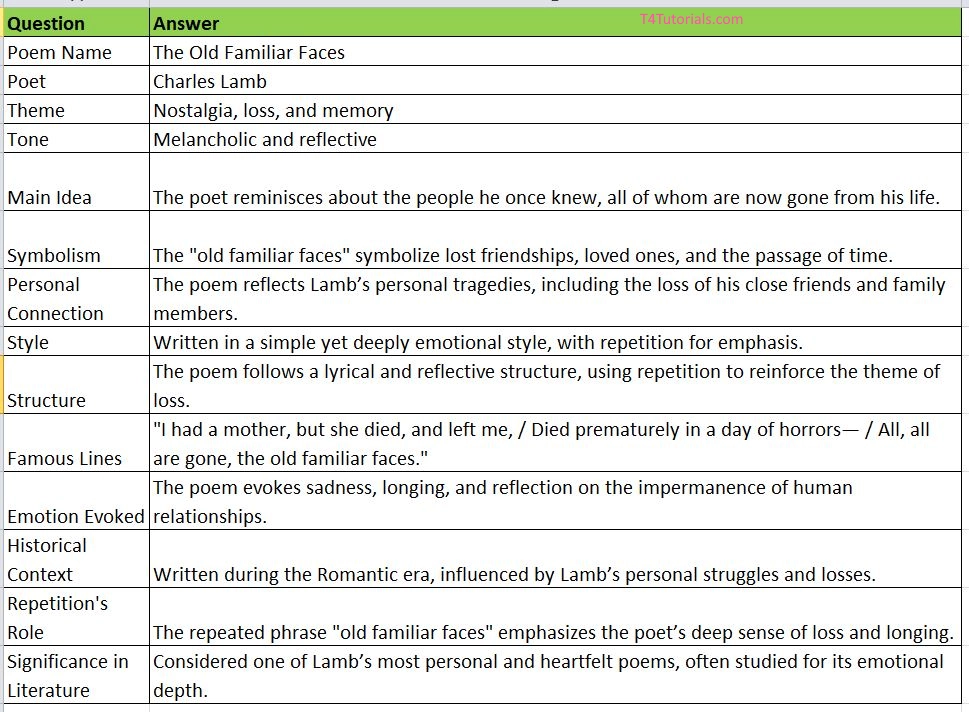Summary:
Charles Lamb’s poem “The Old Familiar Faces” is a melancholic reflection on loss, memory, and nostalgia. The poet recalls the people who were once a significant part of his life but are now gone—either due to death, distance, or time. The repeated phrase “the old familiar faces” emphasizes his deep sense of longing and sorrow.
Lamb mentions childhood friends, family members, and loved ones, highlighting how their absence has left him feeling lonely. He particularly reflects on personal tragedies, including the loss of his mother and close companions. The poem conveys a universal emotion—the pain of losing loved ones and reminiscing about the past.
Through simple yet powerful language, Lamb captures the fleeting nature of life and relationships. The poem serves as a poignant reminder of how time changes everything, leaving behind only memories of “the old familiar faces.”
| Question | Answer |
| Poem Name | The Old Familiar Faces |
| Poet | Charles Lamb |
| Theme | Nostalgia, loss, and memory |
| Tone | Melancholic and reflective |
| Main Idea | The poet reminisces about the people he once knew, all of whom are now gone from his life. |
| Symbolism | The “old familiar faces” symbolize lost friendships, loved ones, and the passage of time. |
| Personal Connection | The poem reflects Lamb’s personal tragedies, including the loss of his close friends and family members. |
| Style | Written in a simple yet deeply emotional style, with repetition for emphasis. |
| Structure | The poem follows a lyrical and reflective structure, using repetition to reinforce the theme of loss. |
| Famous Lines | “I had a mother, but she died, and left me, / Died prematurely in a day of horrors— / All, all are gone, the old familiar faces.” |
| Emotion Evoked | The poem evokes sadness, longing, and reflection on the impermanence of human relationships. |
| Historical Context | Written during the Romantic era, influenced by Lamb’s personal struggles and losses. |
| Repetition’s Role | The repeated phrase “old familiar faces” emphasizes the poet’s deep sense of loss and longing. |
| Significance in Literature | Considered one of Lamb’s most personal and heartfelt poems, often studied for its emotional depth. |

MCQs & Summary of Some Famous Poems by Charles Lamb
- The Old Familiar Faces – MCQs & Summary
- Hester – MCQs & Summary
- A Farewell to Tobacco – MCQs & Summary
- On an Infant Dying as Soon as It Was Born – MCQs & Summary
- The Grandame – MCQs & Summary
- Blindness – MCQs & Summary
- To Margaret W MCQs & Summary
Famous English Authors MCQs
- William Wordsworth MCQs
- William Shakespeare MCQs
- Robert Browning MCQs
- W B Yeats MCQs
- Edmund Spenser MCQs
- Chaucer MCQs
- John Milton MCQs
- S T Coleridge MCQs
- Lord Byron MCQs
- PB Shelley MCQs
- John Dryden MCQs
- John Keats MCQs
- Charles Dicken MCQs
- Alfred Lord Tennyson MCQs
- Charles Lamb MCQs
- D.H Lawrence MCQs
- Thomas Hardy MCQs
- Matthew Arnold MCQs
- John Galsworthy MCQs
- George Bernard Shaw MCQs
- T.S Eliot MCQs
- Ben Jonson MCQs
- Francis Bacon MCQs
- Alexander Pope MCQs
- Oliver Goldsmith MCQs
- Joseph Addison MCQs
- Dr Samuel Johnson MCQs
- Henry Fielding MCQs
- Sir Walter Scott MCQs
- Jane Austen MCQs
- Dr. Samuel Johnson MCQs
- English Comedy MCQs (Oliver Goldsmith)
- Alexander Pope MCQs (Neo-Classical Age of English Poetry)
- Daniel Defoe MCQs
- Dr. Jonathan Swift MCQs
- Richard Steele MCQs
- English Drama MCQs
- Elizabethan Drama MCQs [14th to 17th century]
- Elizabethan Prose MCQs
More English Literature MCQs
- English Poetry MCQs
- History of English Literature MCQs
- Sentimental Novels MCQs
- Sentimental Poetry MCQs
- Legends Of English Literature MCQs
- English Literature Quiz
- English Literature Important Multiple Choice Questions Answers
- Sons And Lovers by D H Lawrence MCQs
- The Waste Land, A Poem by T. S. Eliot MCQs
- Drama Origin MCQs
- History of the Renaissance Period MCQs
- English Pros MCQs
- Non-Dramtic Poets Of The Elizabethan Age MCQs
- The Cavalier Poets of 17th-century MCQs
- Metaphysical Poets of 17th century MCQs
- Renaissance Period of 14th, 15th, and 16th centuries MCQs
- Puritan Poet MCQs
- Restoration Comedy by William Congreve & Wycherley MCQs
- Satire MCQs – Renaissance Period by John Dryden
- English Essayists MCQs
- Romantic Period of Romantic Poets MCQs
- English language MCQs
- English Humour MCQs [American Literature]
- Early Writers of American Literature MCQs
- History of American Literature MCQs
- American Prose MCQs [English Realism ]
- American English Critics
- New Englanders Authors MCQs
- MCQs on American Literature After Independence
- American Playwrights MCQs
- New American Poetry MCQs
- British English Critics MCQs
- Ancient English literature MCQs
- Important English Literature MCQs for Public Service Commission
- English Literature Repeated Important MCQs
- CSS English Literature MCQs
- History of Early Period MCQs
- The Anglo-Saxon period MCQs
- The Age of Chaucer in the Early Period MCQs
- The Anglo-Norman Period of French Writers MCQs
- Metrical Romances MCQ (Anglo-Saxon Period)
- Revival of Learning MCQs (1400-1550)
- Applied Linguistics MCQs
- Language Change MCQs